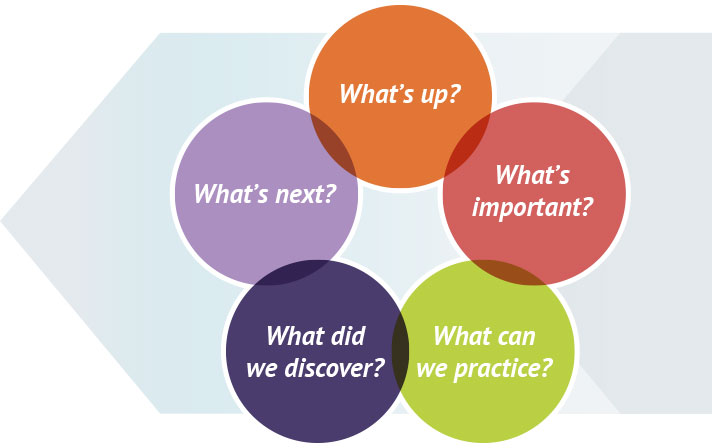A family-infant teacher will come to your home or another natural environment, such as daycare, to work with you, your infant and your family members.
Why do sessions happen at home?
Visits are conducted in the home or other places where your child spends a big part of his or her time because these are the most natural places for your baby.
The home is a "natural environment," a setting where babies are likely to spend most of their time sleeping, playing and learning. The goal of the family-infant teacher or other professional is to work with you to help your baby grow and learn.
Working in the home allows you and the family-infant teacher to practice concepts in natural, daily routines. This makes the ideas easier to remember and use throughout the day.
What happens on a home visit?
You will find over time that there will be a rhythm to what you do on home visits. It might look like this cycle of questions (Carotta, 2011; adapted from Stredler-Brown, Moeller, & Gallegos, 2004).

What's up?
- Starting with "What's up," you review the past week. What went well? What challenges did we have? What questions are on our minds?
What's important?
- Next, you may discuss priorities. You work together to consider priorities for your child and you.
What can we practice?
- Now it is time to practice strategies that address those priorities. Maybe you are working on helping the baby turn when you start talking…or maybe you are learning techniques to increase visual communication. Whatever the goal, you will practice during natural daily routines and try the strategies on for size. This can increase confidence. You will learn to communicate A LOT to surround your baby with language.
What did we discover?
- You will learn to watch your baby carefully for responses to the strategies you are trying. This helps you evaluate what is working, and what approaches might need adjustment to better fit your little one.
- At the end of the session, you will think about what you accomplished today, and what you may want to try in the upcoming week and at the next visit.
- It may seem like you are just playing and doing the things that come naturally. However, some experienced parents of children who are deaf or hard of hearing say that it was not natural at first to surround the baby with communication. You will learn to make your communication accessible and frequent!
What's next?
- Your family-infant teacher will provide helpful coaching, so that you feel confident using new strategies or adapting familiar ones to encourage your baby's development in natural, everyday events.
- You will begin to use every day routines like eating, dressing and going for a walk to foster your child's communication development
- These natural routines will become a powerful tool in helping your baby grow.